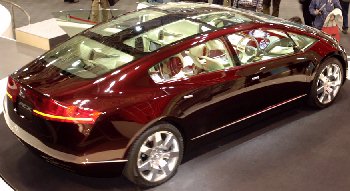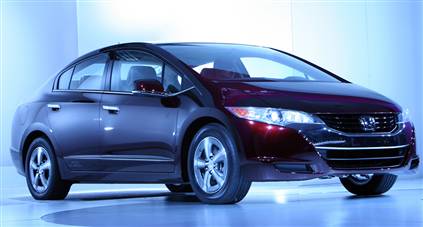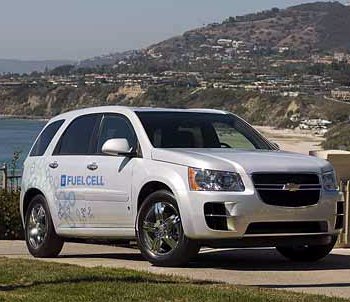|
|
|||||||||||||||||||||||||||||||
|
The Eco-Car Battleground
Let the Fight for Dominance BeginBy Charles Moffat - December 2007. The economics of introducing a new product: Whoever can win over a mass market audience first will dominate the market for years to come. In the highly competitive world of automobiles this is no less true. The hybrid car market is currently being dominated by Toyota, who first won international acceptance in 2001. Even after years in the business Prius still dominates the hybrid car market despite the plethora of other options now available from other car manufacturers. Thus it will be no surprise when whichever company first introduces a mass market hydrogen car that they will in turn dominate the market for years to come. In the cutthroat business of car manufacturing all it takes is a couple bad years to take a champion car company and bankrupt it (take Ford's record losses for example). Thus being the first widely accepted hydrogen car is a prize that is up for grabs, and the money that comes with it. Here is the economics of the situation: When a car manufacturer builds these cars they mass produce to help lower the costs. The problem is that there is no guarantee they will actually sell the cars. The public may simply not be ready yet, or the product may not be up to the public's standards. There will always be a percentage that are sold, but if they don't sell enough of them the company loses money. For example let's say they build 200 cars but need to sell 100 of them just to break even. If they only sell 50 they will have to try and sell the remaining 150 at a huge discount. However if they sell all 200 and get orders for more it means they have extra cash the following year to make design improvements and make the vehicle better. The company with the highest sales can spend more on improvements and by the following year can dominate the market even more. The companies that don't break even have to spend extra in an attempt to catch up, but with no guarantee of drawing in extra sales... which means they could have several years of losses before they finally turn a profit.
The Tokyo Motor Show recently displayed the new generation of green cars. Every major company (including Toyota, Honda and General Motors) is showing off its latest ideas on hybrid vehicles. Going hybrid - using a mix of traditional fuel and electric or battery power - has caught the public imagination and, as Toyota has shown with the Prius, it can sell. In the first nine months of 2007, Toyota sold 7500 Prius cars in the UK - up from about 5000 for the whole of 2006. Around the world Toyota expects to sell 400,000 Prius cars during 2007. In Tokyo, Toyota is unveiling the next generation: the 1/X, which has a lightweight carbon-fibre body and is one third of the overall weight and twice as efficient as the Prius. GM is working on its own hybrid called The Volt, due out in 2010, while Mitsubishi has an electric car called the i-Car which it plans to bring to market in 2009.
Speed BumpBut there is a snag. These eco-friendly vehicles may have low carbon emissions but they are expensive to produce and run. Some breeds, such as hydrogen-powered cars, are not even practical - hydrogen is not easily distributed at this point because a network of hydrogen fuelling stations is not expected until 2010. We all know hybrid and electric cars are in vogue, as sales continue to skyrocket. There were 13,381 new alternatively fuelled vehicles on the road in Britain in the first nine months of 2007. But that pales in comparison with the figure for standard vehicles: 1.9m so far in the UK in 2007. Demand is being sparked by the rising oil price, which has quadrupled in the past five years, but it's not key. Drivers wanting to save money on gasoline first have to contend with the cost of the car - and hybrids aren't cheap at this point. At around $36,000, a Prius costs approx. double the price of an equivalent conventional car.
European SensibilitiesMuch more significant in Europe is the governments encouraging people to buy them. Drive a Prius or another eco-friendly model and you avoid road tax, the congestion charge in London and parking charges in Westminster. This explains why hybrid sales are quite high in Europe and relatively low in Canada and the USA. The EU plans to impose tough CO2 reduction targets have shaken the car industry. The European Parliament has called for manufacturers to cut the permitted CO2 emissions, averaged across a car maker's model range, to 125 grammes with a deadline of 2015. Average car emissions are currently around 160 grammes. MEPs are talking about imposing penalties, and even fines, on firms who fail to meet the targets. Japanese manufacturers have been leading the way on hybrid technology but the EU move and pressure from would-be consumers is pushing European firms such as Renault and Peugeot to step into the field. The problem they all face is that developing new engine types is an expensive and risky business. The companies fear that there is no guarantee which of the types - gasoline-electric or diesel-electric hybrids, hydrogen-powered fuel-cells or lithium batteries - will take off and actually sell, so they're all being cautious. The losers of the situation are going to be those who have not got it right by the time the European regulations come into force.
Fuel Cells Now
Over the years the Los Angeles auto show has gained a reputation as a venue where the world’s automakers show off the latest and greatest alternative-fuel ideas. Now one of those forward-thinking alternative technologies looks a step closer to widespread adoption. Honda has unveiled its new FCX Clarity, powered by a hydrogen fuel cell. The sleek, low-slung sedan — which Honda plans to begin leasing to a limited number of Southern California drivers next summer — is fashioned after a concept vehicle Honda unveiled in 2005. The car will be available on a three-year lease for $600 a month, making it the first fuel-cell car to be offered to the general public. The Clarity will get a combined city and highway fuel economy of 68 miles per gallon — twice that of the Honda Accord — and a driving range of 270 miles. Drivers will have to stay in Southern California where they will have access to the limited number of hydrogen fuel stations. But the introduction of the Clarity represents more than just a cool new alternative-fuel car. Just a few years ago, the idea that a car could run on hydrogen with water as the only tailpipe emission, seemed many years off but is now a reality.
General Motors will also put 100 hydrogen fuel cell-powered Chevy Equinox compact SUVs on the road in California, New York and Washington, D.C. in 2008, giving them to hand-picked users such as politicians and celebrities. GM says it expects to ramp up production on hydrogen cars to about 1 million vehicles a year worldwide after 2012. Consider that just a few years ago every fuel-cell vehicle was a multimillion-dollar prospect and each one was built by hand. Now automakers are talking much higher numbers. Ford is still some way behind when it comes to fuel-cell vehicles. Ford President and CEO Alan Mulally says Ford is at least 10 years away from offering a fuel-cell car. “We’re not there yet,” Mulally said Wednesday at the Los Angeles show, adding that the prospect of a vehicle that emits nothing but water is “one compelling vision.” Honda says it is also working to develop a “Home Energy Station” — a device that uses electricity to create hydrogen. As the hydrogen supply infrastructure expands, Honda plans to make a greater number of FCX Clarity vehicles available to the public. Similarly, oil-importer Shell announced the establishment of a dedicated hydrogen fueling facility in White Plains, New York, for the Chevy Equinox test program, called “Project Driveway.” Despite the obvious obstacles the automotive industry does seem to be stepping up to the plate, albeit slowly in some cases.
|
|
||||||||||||||||||||||||||||||
|
Website Design + SEO by designSEO.ca ~ Owned + Edited by Suzanne MacNevin | |||||||||||||||||||||||||||||||



